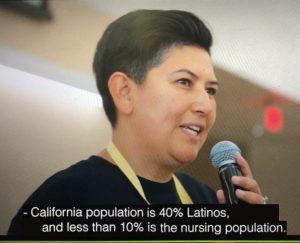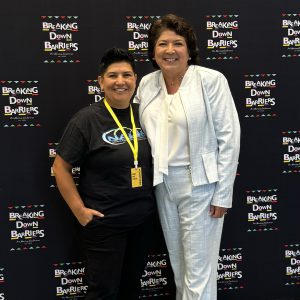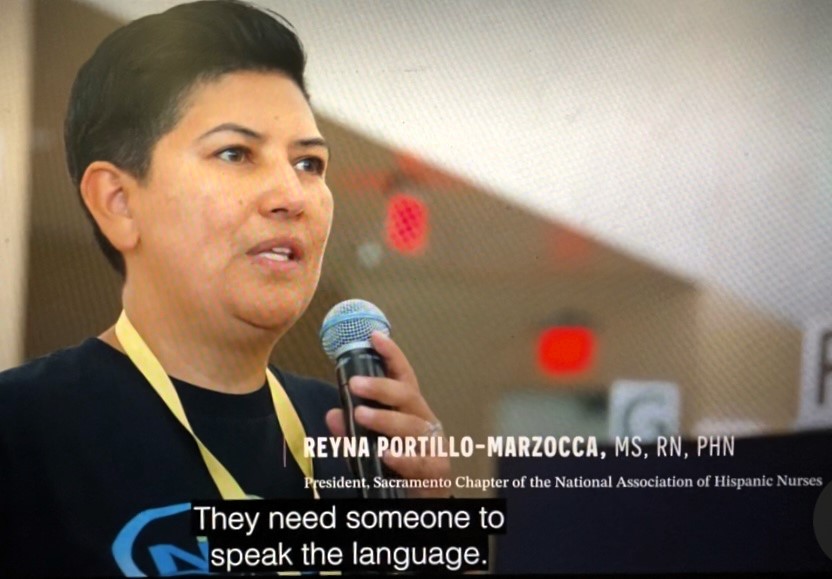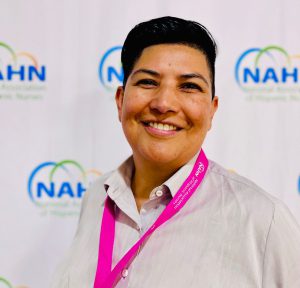Latinos are the largest racial and ethnic group in California yet make up disproportionately small percentage of the nursing workforce. Nearly 40% of California’s population is Latinx according to the state census. However, surveys of registered nurses have found fewer than 10% identify as such. This schism is important. Mounting evidence suggests that serious consequences – poor communication, lower perception of care, and worse outcomes – can arise when a healthcare workforce doesn’t mirror their patients.
“Patients need someone who can speak their language, and who they can feel comfortable with,” says Reyna Portillo-Marzocca, assistant nurse manager at Sutter Roseville Medical Center. Her declaration is shared on screen, midway through the new documentary film Everybody’s Work: Healing What Hurts All of Us.
The film spotlights racism experienced by nurses. It also explores the structural racism that can hold historically marginalized people back from pursuing or attaining a nursing degree. Together these forces affect workforce diversity, which can in-turn impact the quality of care that Latino or Hispanic patients receive.
“Patients have told me how important it was to them that I spoke their language or understood that seeing their family was a necessity, not a ‘nice to have,’” says Portillo-Marzocca. “Having someone from their own culture at the bedside, patients say it makes them feel less isolated and frightened.”
The comfort of a familiar face was especially critical during the height of the COVID-19 pandemic.
An ICU nurse at Sutter Medical Center, Sacramento at the time, Portillo-Marzocca remembers weeks when every patient in her unit, the COVID ward, was Hispanic. “I was standing there, looking at the central monitors, and every name was from my community. I started crying and a co-worker came up to me and asked if I knew someone in one of the beds, and I said I knew them all, that these were my people.”
During that vulnerable time, Portillo-Marzocca remembers hearing comments around her that the Latino population was harder hit by the virus because they “have too many kids and too many people living under one roof.” Recounting this time period still brings her to tears.
“That’s why we need things like this film,” says Portillo-Marzocca, referring to Everybody’s Work. “People bring bias and stereotypes into their work, and if you’re a nurse, that will influence the care you provide.” The documentary increases awareness of assumptions that can prevent medical providers from delivering equitable care. It also suggests ways that people can educate themselves and confront their implicit biases to become more culturally competent and confident caring for a diverse patient population in an equitable manner.
“It’s everyone’s job to be ready to provide equitable care,” says Portillo-Marzocca. “This film should be required viewing for all healthcare workers.” Sutter Health is organizing screenings of the film for its workforce.
Portillo-Marzocca is equally passionate about the film’s second focus: increasing diversity in the nursing profession. “We need multiple pathways to nursing education,” she says. “Plenty of nurses come to the profession later in life, and we should make that easier to do.”
Portillo-Marzocca speaks from experience. She was 37 years old when she was started a nursing associates degree program at American River College, the first school in the state to offer a direct bridge into a bachelor of science degree in nursing.
In the decade since Portillo-Marzocca began her associates degree she’s worked as a bedside nurse for eight years, six of those in the Sutter Health system. She’s also earned her master of science degree in nursing and become a leader in the profession. In May 2023 she was named president of the Sacramento chapter of the National Association of Hispanic Nurses. “When our new board got to work in July 2023 we had 33 members, as of August of this year we had more than 80,” she says proudly.
To learn more or join the Sacramento chapter of NAHN visit their website or LinkedIn page.
In fact, the Sacramento chapter was recently named among the top 10 largest NAHN chapters, based on membership size, and Portillo-Marzocca placed first among those who received ambassador awards for their recruitment efforts. But it’s her one-on-one work with individuals that sparks her enthusiasm most.
 In partnership with Capitol City Black Nurses, Hmong Nurses Association and Philippine Nurses Association-Greater Sacramento area, Portillo-Marzocca and the NAHN chapter she leads has co-hosted an annual event to encourage more historically marginalized people to consider a career in nursing. Now in its fourth year, the weekend “Breaking Down Barriers to Nursing” conference and showcase is advertised through high schools and adult schools in the greater Sacramento region – especially those in historically under-resourced communities.
In partnership with Capitol City Black Nurses, Hmong Nurses Association and Philippine Nurses Association-Greater Sacramento area, Portillo-Marzocca and the NAHN chapter she leads has co-hosted an annual event to encourage more historically marginalized people to consider a career in nursing. Now in its fourth year, the weekend “Breaking Down Barriers to Nursing” conference and showcase is advertised through high schools and adult schools in the greater Sacramento region – especially those in historically under-resourced communities.
“I love growing people and if I can make a difference, then I want to,” Portillo-Marzocca remarks. “I’ve helped people apply for jobs and heard back after they were hired, thanking me for my help, and I always say ‘now I want you to pay it forward,’ whether that’s through improving patient care or by supporting the next generation of nurses.”
To put that mission into action, Sutter has:
- Endowed $400,000 to Los Rios Community College District and $200,000 each to American River College and Sacramento City College in perpetual scholarships to support students enrolled in nursing or allied health education programs.
- Created a joint nursing program with Los Rios Community College District which helped support over 550 nurse graduates in the Sacramento region.
- Partnered with Samuel Merritt University and California State University, Sacramento.
In response to the shortage of nurses who reflect the diversity of California’s population, Sutter supports professional organizations including the National Black Nurses Association and the National Association of Hispanic Nurses.






